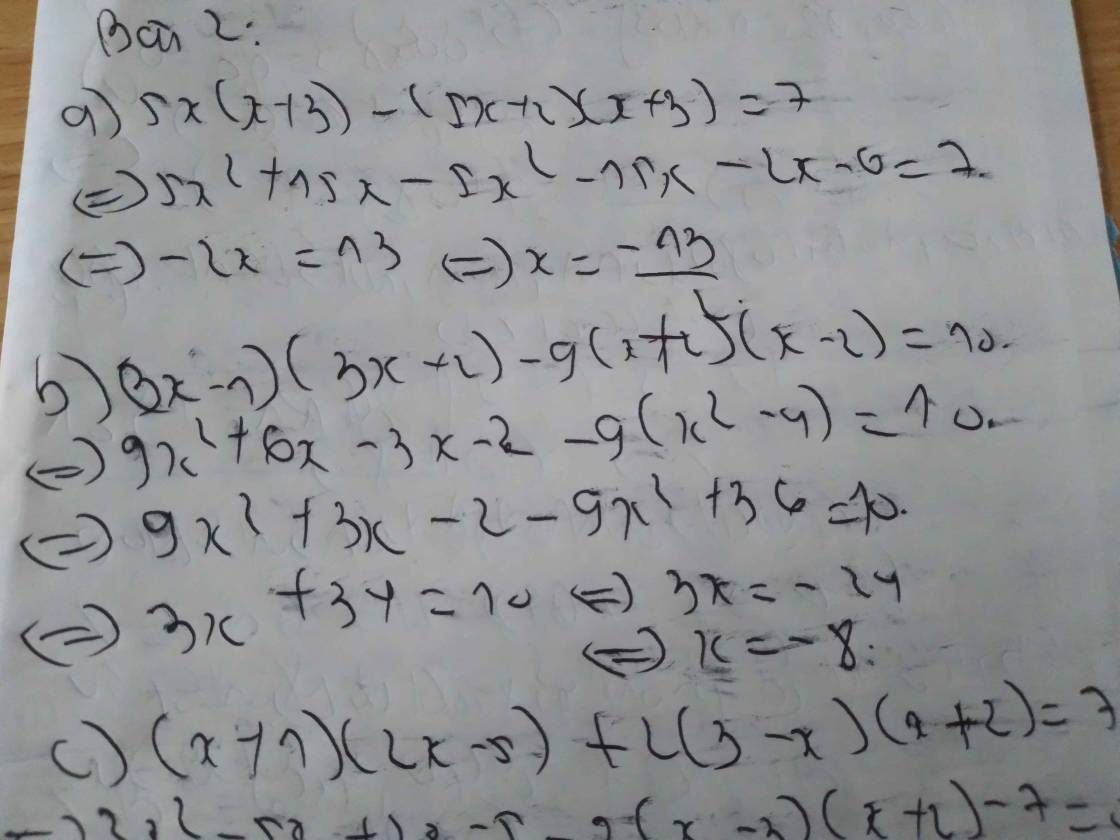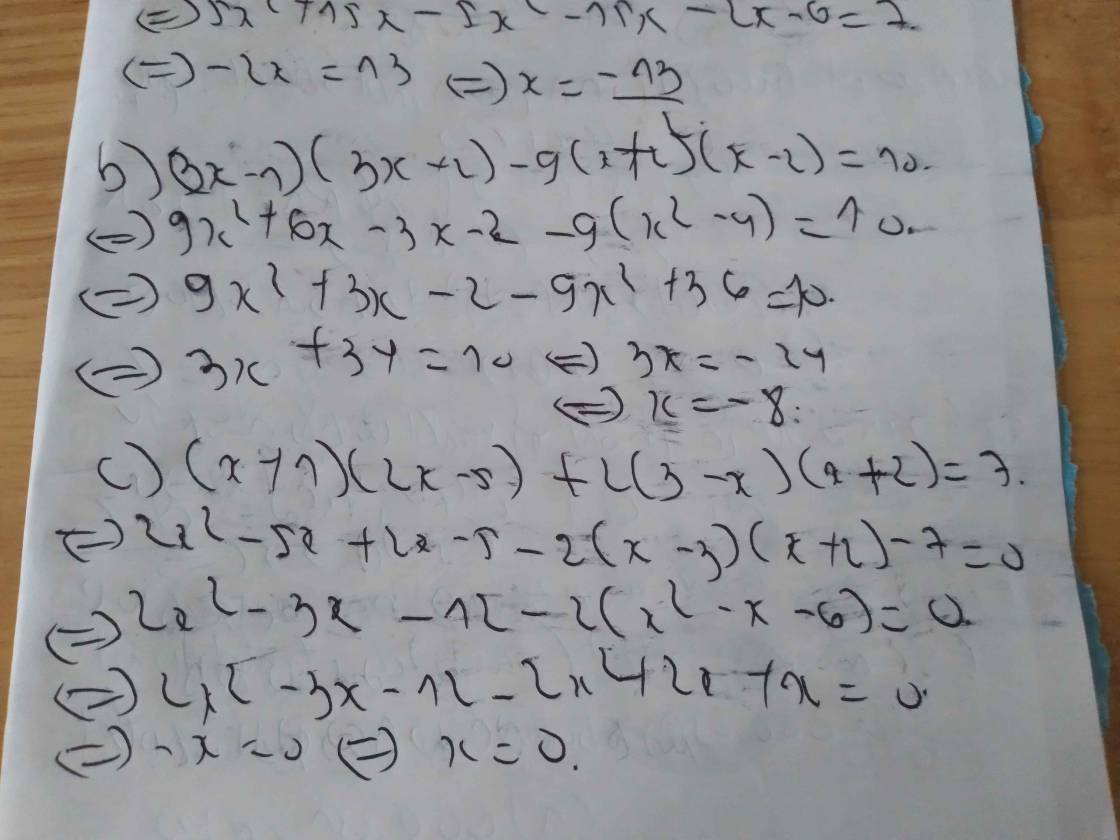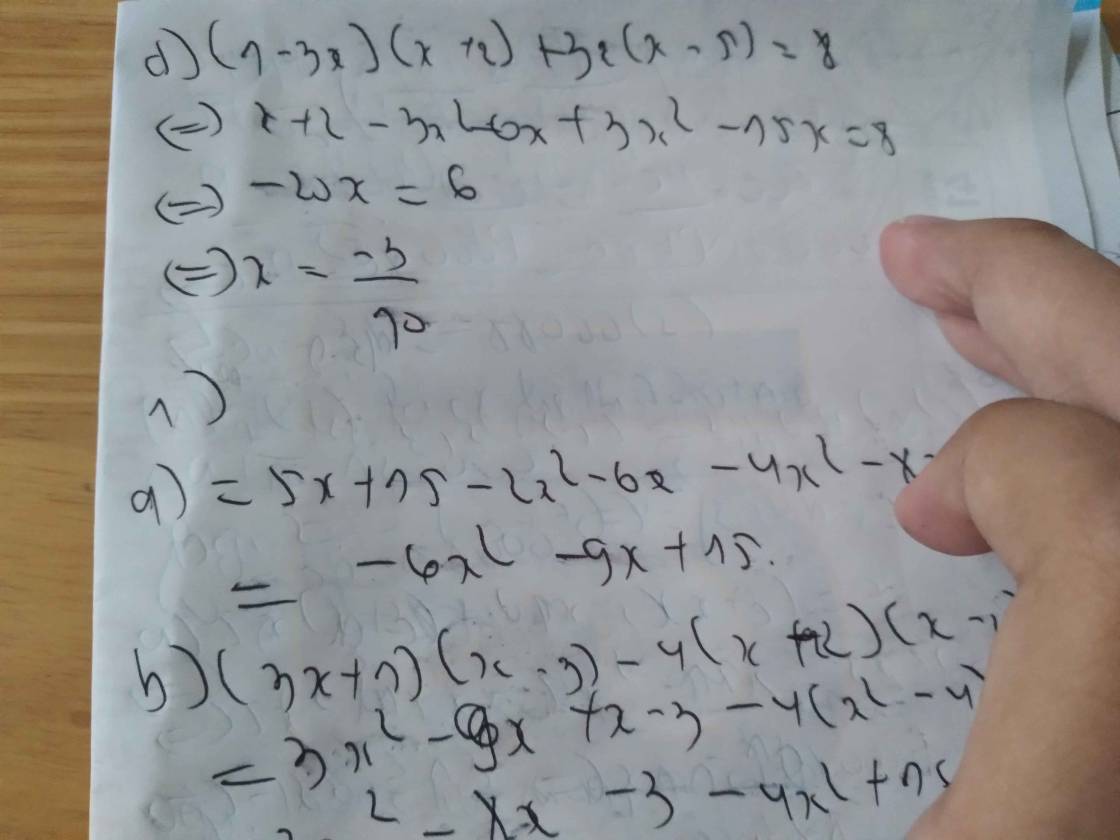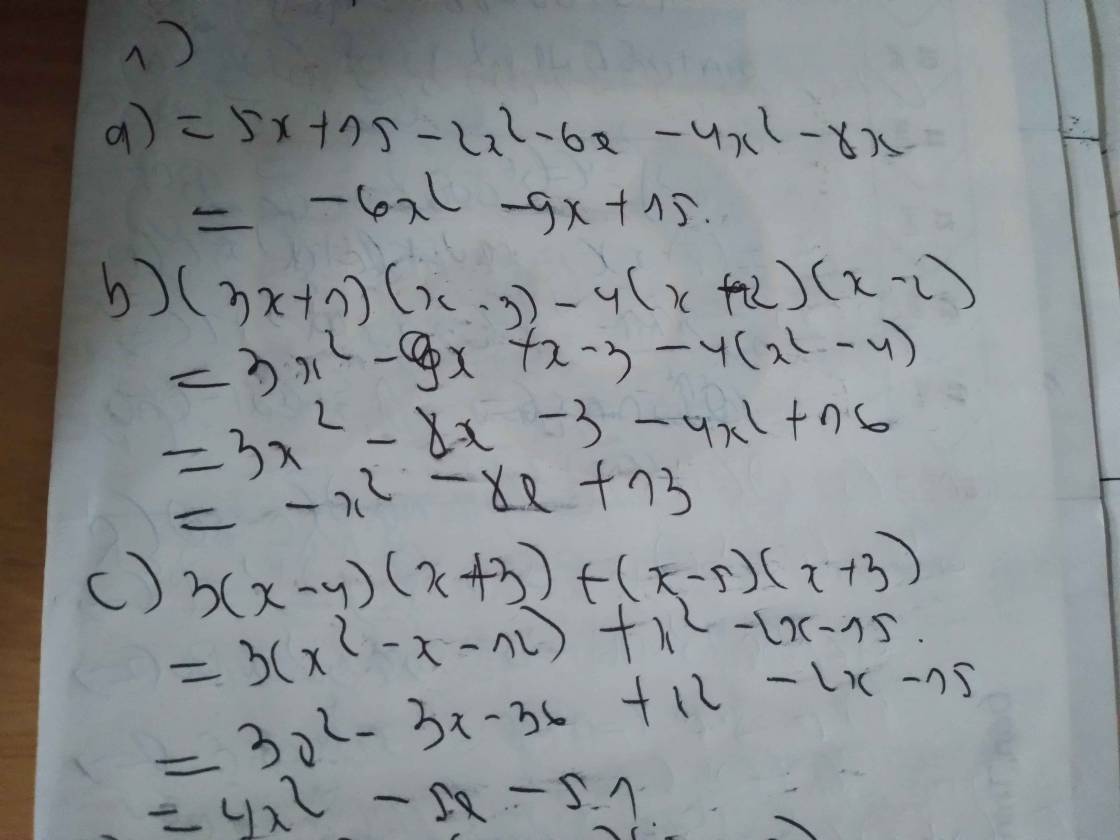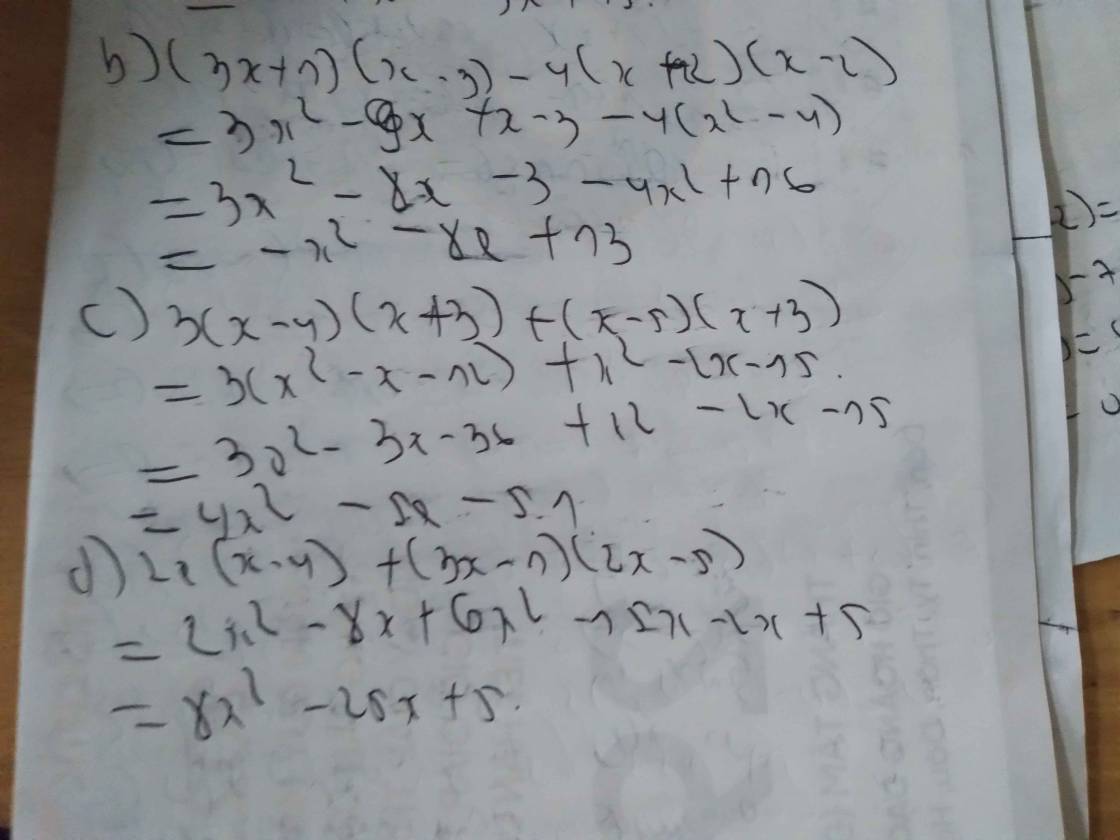tìm x biết
a.3x +1/2 (x-1)=x+7(1-x)
b. 4x(x+3)-2=(2x+3)(2x-3)
NS
Những câu hỏi liên quan
tìm x biết
a,5x(x-4)3(x+2)(x-4)=2x(x+1)
b,4x(x+2)-x(8x-5)=10
c,(x+3)(2x-5)=2x(x+4)
d,(3x-2)(x+5)-3x(x+4)=5
e,x(x-3)+2x(x+1)=3(x mũ2-4)
b: =>4x^2+8x-8x^2+5x-10=0
=>-4x^2+13x-10=0
=>x=2 hoặc x=5/4
c: =>2x^2-5x+6x-15=2x^2+8x
=>x-15=8x
=>-7x=15
=>x=-15/7
d: =>3x^2+15x-2x-10-3x^2-12x=5
=>x-10=5
=>x=15
e: =>x^2-3x+2x^2+2x=3x^2-12
=>-x=-12
=>x=12
Đúng 0
Bình luận (0)
Bài 1:Thực hiện phép tính
a,(5-2x)(x+3)-4x(x+2) b,(3x+1)(x-3)-4(x+2)(x-2)
c,3(x-4)(x+3)+(x-5)(x+3) d,2x(x-4)+(3x-1)(2x-5)
Bài 2:Tìm x biết
a,5x(x+3)-(5x+2)(x+3)=7
b,(3x-1)(3x+2)-9(x+2)(x-2)=10
c,(x+1)(2x-5)+2(3-x)(x+2)=7
d,(1-3x)(x+2)+3x(x-5)=8
tìm x , biết
a) 17/6- x( x-7/6)= 7/4
b) 3/35 - ( 3/5-x)= 2/7
tìm x thuộc Z , biết
3/4-5/6 < x/12 < 1 -( 2/3-1/4)
tìm x biết
a ) 2x-3=x + 1/2
b) 4x- ( x+ 1/2) = 2x - ( 1/2 - 5 )
Bài 1:
a) Ta có: \(\dfrac{17}{6}-x\left(x-\dfrac{7}{6}\right)=\dfrac{7}{4}\)
\(\Leftrightarrow\dfrac{17}{6}-x^2+\dfrac{7}{6}x-\dfrac{7}{4}=0\)
\(\Leftrightarrow-x^2+\dfrac{7}{6}x+\dfrac{13}{12}=0\)
\(\Leftrightarrow-12x^2+14x+13=0\)
\(\Delta=14^2-4\cdot\left(-12\right)\cdot13=196+624=820\)
Vì Δ>0 nên phương trình có hai nghiệm phân biệt là:
\(\left\{{}\begin{matrix}x_1=\dfrac{14-2\sqrt{205}}{-24}=\dfrac{-7+\sqrt{205}}{12}\\x_2=\dfrac{14+2\sqrt{2015}}{-24}=\dfrac{-7-\sqrt{205}}{12}\end{matrix}\right.\)
b) Ta có: \(\dfrac{3}{35}-\left(\dfrac{3}{5}-x\right)=\dfrac{2}{7}\)
\(\Leftrightarrow\dfrac{3}{5}-x=\dfrac{3}{35}-\dfrac{10}{35}=\dfrac{-7}{35}=\dfrac{-1}{5}\)
hay \(x=\dfrac{3}{5}-\dfrac{-1}{5}=\dfrac{3}{5}+\dfrac{1}{5}=\dfrac{4}{5}\)
Đúng 4
Bình luận (0)
Bài 3:
a) Ta có: \(2x-3=x+\dfrac{1}{2}\)
\(\Leftrightarrow2x-x=\dfrac{1}{2}+3\)
\(\Leftrightarrow x=\dfrac{7}{2}\)
b) Ta có: \(4x-\left(x+\dfrac{1}{2}\right)=2x-\left(\dfrac{1}{2}-5\right)\)
\(\Leftrightarrow3x-\dfrac{1}{2}-2x+\dfrac{1}{2}-5=0\)
\(\Leftrightarrow x=5\)
Đúng 0
Bình luận (0)
bài 1: phân tích đa thức thành nhân tử
a,2x+10y
b,x\(^2+4x+4\)
c,\(x^2-y^2+10y-25\)
bài 2 tìm x, biết
a,\(x^2-3x+x-3=0\)
b,\(2x\left(x-3\right)-\dfrac{1}{2}\left(4x^2-3\right)=0\)
c,\(x^2-\left(x-3\right)\left(2x-5\right)=9\)
\(B1\\ a,2x+10y=2\left(x+5y\right)\\ b,x^2+4x+4=x^2+2.2x+2^2=\left(x+2\right)^2\\ c,x^2-y^2+10y-25\\ =\left(x^2-y^2\right)+5\left(2y-5\right)\\ =\left(x-y\right)\left(x+y\right)+5\left(2y-5\right)\\ B2\)
\(a,x^2-3x+x-3=0\\ =>x\left(x-3\right)+\left(x-3\right)=0\\ =>\left(x+1\right)\left(x-3\right)=0\\ =>\left[{}\begin{matrix}x+1=0\\x-3=0\end{matrix}\right.=>\left[{}\begin{matrix}x=-1\\x=3\end{matrix}\right.\\ b,2x\left(x-3\right)-\dfrac{1}{2}\left(4x^2-3\right)=0\\ =>2x^2-6x-2x^2+\dfrac{3}{2}=0\\ =>-6x=-\dfrac{3}{2}\\ =>x=\left(-\dfrac{3}{2}\right):\left(-6\right)\\ =>x=\dfrac{1}{4}\\ c,x^2-\left(x-3\right)\left(2x-5\right)=9\\ =>x^2-2x^2+6x+5x-15=9\\ =>-x^2+11-15-9=0\\ =>-x^2+11x-24=0\\ =>-x^2+8x+3x-24=0\\ =>-x\left(x-8\right)+3\left(x-8\right)=0\\ =>\left(3-x\right)\left(x-8\right)=0\\ =>\left[{}\begin{matrix}3-x=0\\x-8=0\end{matrix}\right.=>\left[{}\begin{matrix}x=3\\x=8\end{matrix}\right.\)
Đúng 0
Bình luận (0)
Bài 1 : Phân tích đa thức thành nhân tử a) 5x^2y-20xy^2b) 1-8x+16x^2-y^2c) 4x-4-x^2d) x^3-2x^2+x-xy^2 e)27-3x^2f) 2x^2+4x+2-2y^2Bài 2: tìm x, biếta) x^2(x-2023)-2023+x0b) -x(x-4)+(2x^3-4x^2-9x):x0c) x^2+2x-3x-60d) 3x(x-10)-2x+200
Đọc tiếp
Bài 1 : Phân tích đa thức thành nhân tử
a) 5x^2y-20xy^2
b) 1-8x+16x^2-y^2
c) 4x-4-x^2
d) x^3-2x^2+x-xy^2
e)27-3x^2
f) 2x^2+4x+2-2y^2
Bài 2: tìm x, biết
a) x^2(x-2023)-2023+x=0
b) -x(x-4)+(2x^3-4x^2-9x):x=0
c) x^2+2x-3x-6=0
d) 3x(x-10)-2x+20=0
Bài 1
a) 5x²y - 20xy²
= 5xy(x - 4y)
b) 1 - 8x + 16x² - y²
= (1 - 8x + 16x²) - y²
= (1 - 4x)² - y²
= (1 - 4x - y)(1 - 4x + y)
c) 4x - 4 - x²
= -(x² - 4x + 4)
= -(x - 2)²
d) x³ - 2x² + x - xy²
= x(x² - 2x + 1 - y²)
= x[(x² - 2x+ 1) - y²]
= x[(x - 1)² - y²]
= x(x - 1 - y)(x - 1 + y)
= x(x - y - 1)(x + y - 1)
e) 27 - 3x²
= 3(9 - x²)
= 3(3 - x)(3 + x)
f) 2x² + 4x + 2 - 2y²
= 2(x² + 2x + 1 - y²)
= 2[(x² + 2x + 1) - y²]
= 2[(x + 1)² - y²]
= 2(x + 1 - y)(x + 1 + y)
= 2(x - y + 1)(x + y + 1)
Đúng 2
Bình luận (1)
Bài 2:
a: \(x^2\left(x-2023\right)+x-2023=0\)
=>\(\left(x-2023\right)\left(x^2+1\right)=0\)
mà \(x^2+1>=1>0\forall x\)
nên x-2023=0
=>x=2023
b:
ĐKXĐ: x<>0
\(-x\left(x-4\right)+\left(2x^3-4x^2-9x\right):x=0\)
=>\(-x\left(x-4\right)+2x^2-4x-9=0\)
=>\(-x^2+4x+2x^2-4x-9=0\)
=>\(x^2-9=0\)
=>(x-3)(x+3)=0
=>\(\left[{}\begin{matrix}x-3=0\\x+3=0\end{matrix}\right.\Leftrightarrow\left[{}\begin{matrix}x=3\\x=-3\end{matrix}\right.\)
c: \(x^2+2x-3x-6=0\)
=>\(\left(x^2+2x\right)-\left(3x+6\right)=0\)
=>\(x\left(x+2\right)-3\left(x+2\right)=0\)
=>(x+2)(x-3)=0
=>\(\left[{}\begin{matrix}x+2=0\\x-3=0\end{matrix}\right.\Leftrightarrow\left[{}\begin{matrix}x=3\\x=-2\end{matrix}\right.\)
d: 3x(x-10)-2x+20=0
=>\(3x\left(x-10\right)-\left(2x-20\right)=0\)
=>\(3x\left(x-10\right)-2\left(x-10\right)=0\)
=>\(\left(x-10\right)\left(3x-2\right)=0\)
=>\(\left[{}\begin{matrix}x-10=0\\3x-2=0\end{matrix}\right.\Leftrightarrow\left[{}\begin{matrix}x=\dfrac{2}{3}\\x=10\end{matrix}\right.\)
Câu 1:
a: \(5x^2y-20xy^2\)
\(=5xy\cdot x-5xy\cdot4y\)
\(=5xy\left(x-4y\right)\)
b: \(1-8x+16x^2-y^2\)
\(=\left(16x^2-8x+1\right)-y^2\)
\(=\left(4x-1\right)^2-y^2\)
\(=\left(4x-1-y\right)\left(4x-1+y\right)\)
c: \(4x-4-x^2\)
\(=-\left(x^2-4x+4\right)\)
\(=-\left(x-2\right)^2\)
d: \(x^3-2x^2+x-xy^2\)
\(=x\left(x^2-2x+1-y^2\right)\)
\(=x\left[\left(x^2-2x+1\right)-y^2\right]\)
\(=x\left[\left(x-1\right)^2-y^2\right]\)
\(=x\left(x-1-y\right)\left(x-1+y\right)\)
e: \(27-3x^2\)
\(=3\left(9-x^2\right)\)
\(=3\left(3-x\right)\left(3+x\right)\)
f: \(2x^2+4x+2-2y^2\)
\(=2\left(x^2+2x+1-y^2\right)\)
\(=2\left[\left(x^2+2x+1\right)-y^2\right]\)
\(=2\left[\left(x+1\right)^2-y^2\right]\)
\(=2\left(x+1+y\right)\left(x+1-y\right)\)
Đúng 1
Bình luận (1)
Bài 2
a) x²(x - 2023) - 2023 + x = 0
x²(x - 2023) - (x - 2023) = 0
(x - 2023)(x² - 1) = 0
x - 2023 = 0 hoặc x² - 1 = 0
*) x - 2023 = 0
x = 2023
*) x² - 1 = 0
x² = 1
x = 1 hoặc x = -1
Vậy x = -1; x = 1; x = 2023
b) -x(x - 4) + (2x³ - 4x² - 9x) : x = 0
-x² + 4x + 2x² - 4x - 9 = 0
x² - 9 = 0
x² = 9
x = 3 hoặc x = -3
Vậy x = 3; x = -3
c) x² + 2x - 3x - 6 = 0
(x² + 2x) - (3x + 6) = 0
x(x + 2) - 3(x + 2) = 0
(x + 2)(x - 3) = 0
x + 2 = 0 hoặc x - 3 = 0
*) x + 2 = 0
x = -2
*) x - 3 = 0
x = 3
Vậy x = -2; x = 3
d) 3x(x - 10) - 2x + 20 = 0
3x(x - 10) - (2x - 20) = 0
3x(x - 10) - 2(x - 10) = 0
(x - 10)(3x - 2) = 0
x - 10 = 0 hoặc 3x - 2 = 0
*) x - 10 = 0
x = 10
*) 3x - 2 = 0
3x = 2
x = 2/3
Vậy x = 2/3; x = 10
Đúng 2
Bình luận (1)
1/ Thực hiện phép nhân :
a) x2 ( 5x3 - x - \(\dfrac{1}{2}\))
b) ( 3xy - x2 + y ) \(\dfrac{2}{3}\)x2y
c) x2 ( 4x3 - 5xy + 2x ) ( -\(\dfrac{1}{2}\) xy )
2/ Tìm x, biết
a) 3x( 12x - 4 ) - 9x (4x - 3 ) = 30
b ) x( 5 - 2x ) + 2x ( x - 1 )= 15
2.
a. 3x(12x - 4) - 9x(4x - 3) = 30
<=> 36x2 - 12x - 36x2 + 27x = 30
<=> 36x2 - 36x2 - 12x + 27x = 30
<=> 15x = 30
<=> x = 2
b. x(5 - 2x) + 2x(x - 1) = 15
<=> 5x - 2x2 + 2x2 - 2x = 15
<=> -2x2 + 2x2 + 5x - 2x = 15
<=> 3x = 15
<=> x = 5
Đúng 1
Bình luận (0)
a) x2 ( 5x3 - x - 2323x2y= 6969x3y2- 2323x4y+ 2323x2y2
c) x2 ( 4x3 - 5xy + 2x ) ( -
Đúng 0
Bình luận (0)
Tìm x, biết
a) / 3x-2 / = 4
b) / 5x-3 / = / 7-x /
c) 2 - / x-1 /- 3x = 7
d) / 2x+3 / + 2x = -4
giúp em zới gấp lắm rồi ạ!!! ;-;
a: \(\left|3x-2\right|=4\)
\(\Leftrightarrow\left[{}\begin{matrix}3x-2=4\\3x-2=-4\end{matrix}\right.\Leftrightarrow\left[{}\begin{matrix}x=2\\x=-\dfrac{2}{3}\end{matrix}\right.\)
b: Ta có: \(\left|5x-3\right|=\left|x-7\right|\)
\(\Leftrightarrow\left[{}\begin{matrix}5x-3=x-7\\5x-3=7-x\end{matrix}\right.\Leftrightarrow\left[{}\begin{matrix}4x=-4\\6x=10\end{matrix}\right.\Leftrightarrow\left[{}\begin{matrix}x=-1\\x=\dfrac{5}{3}\end{matrix}\right.\)
Đúng 1
Bình luận (0)
: Tìm x, biết:
a) 3x( 4x- 1) - 2x(6x- 3 )30 b) 2x(3-2x) + 2x(2x-1)15
c) (5x-2)(4x-1) + (10x +3)(2x - 1)1 d) (x+2) (x+2)- (x -3)(x+1) 9
e) (4x+1)(6x-3) 7 + (3x – 2)(8x + 9) g) (10x+2)(4x- 1)- (8x -3)(5x+2) 14
Đọc tiếp
: Tìm x, biết:
a) 3x( 4x- 1) - 2x(6x- 3 )=30 b) 2x(3-2x) + 2x(2x-1)=15
c) (5x-2)(4x-1) + (10x +3)(2x - 1)=1 d) (x+2) (x+2)- (x -3)(x+1) = 9
e) (4x+1)(6x-3) = 7 + (3x – 2)(8x + 9) g) (10x+2)(4x- 1)- (8x -3)(5x+2) =14
`@` `\text {Ans}`
`\downarrow`
`a)`
`3x(4x-1) - 2x(6x-3) = 30`
`=> 12x^2 - 3x - 12x^2 + 6x = 30`
`=> 3x = 30`
`=> x = 30 \div 3`
`=> x=10`
Vậy, `x=10`
`b)`
`2x(3-2x) + 2x(2x-1) = 15`
`=> 6x- 4x^2 + 4x^2 - 2x = 15`
`=> 4x = 15`
`=> x = 15/4`
Vậy, `x=15/4`
`c)`
`(5x-2)(4x-1) + (10x+3)(2x-1) = 1`
`=> 5x(4x-1) - 2(4x-1) + 10x(2x-1) + 3(2x-1)=1`
`=> 20x^2-5x - 8x + 2 + 20x^2 - 10x +6x - 3 =1`
`=> 40x^2 -17x - 1 = 1`
`d)`
`(x+2)(x+2)-(x-3)(x+1)=9`
`=> x^2 + 2x + 2x + 4 - x^2 - x + 3x + 3=9`
`=> 6x + 7 =9`
`=> 6x = 2`
`=> x=2/6 =1/3`
Vậy, `x=1/3`
`e)`
`(4x+1)(6x-3) = 7 + (3x-2)(8x+9)`
`=> 24x^2 - 12x + 6x - 3 = 7 + (3x-2)(8x+9)`
`=> 24x^2 - 12x + 6x - 3 = 7 + 24x^2 +11x - 18`
`=> 24x^2 - 6x - 3 = 24x^2 + 18x -11`
`=> 24x^2 - 6x - 3 - 24x^2 + 18x + 11 = 0`
`=> 12x +8 = 0`
`=> 12x = -8`
`=> x= -8/12 = -2/3`
Vậy, `x=-2/3`
`g)`
`(10x+2)(4x- 1)- (8x -3)(5x+2) =14`
`=> 40x^2 - 10x + 8x - 2 - 40x^2 - 16x + 15x + 6 = 14`
`=> -3x + 4 =14`
`=> -3x = 10`
`=> x= - 10/3`
Vậy, `x=-10/3`
Đúng 1
Bình luận (0)
1 phân tích đa thức thành nhân tử
a,\(3x^2-6xy+3y^2\)
b,\(\left(x-y\right)^2-4x^2\)
2.tìm x biết
a,2x(x-3)-x+3=0
b,\(x^2+5x+6=0\)
`1)`
`a)3x^2-6xy+3y^2=3(x^2-2xy+y^2)=3(x-y)^2`
`b)(x-y)^2-4x^2=(x-y-2x)(x-y+2x)=(-x-y)(3x-y)`
`2)`
`a)2x(x-3)-x+3=0`
`<=>2x(x-3)-(x-3)=0`
`<=>(x-3)(2x-1)=0`
`<=>[(x=3),(x=1/2):}`
`b)x^2+5x+6=0`
`<=>x^2+2x+3x+6=0`
`<=>(x+2)(x+3)=0`
`<=>[(x=-2),(x=-3):}`
Đúng 4
Bình luận (0)
Tìm x biết
1.(x+3)2-(x+2).(x-2)=4x+17
2.(2x+1)2-(4x-1).(x-3)-15=0
3.(2x+3).(x-1)+(2x-3).(1-x)=0
4.2(5x-8)-3(4x-5)=4(3x-4)+11
5.(3x-1).(2x-7)-(1-3x).(6x-5)=0
1: Ta có: \(\left(x+3\right)^2-\left(x+2\right)\left(x-2\right)=4x+17\)
\(\Leftrightarrow x^2+6x+9-x^2+4-4x=17\)
\(\Leftrightarrow x=2\)
3: Ta có: \(\left(2x+3\right)\left(x-1\right)+\left(2x-3\right)\left(1-x\right)=0\)
\(\Leftrightarrow2x^2-2x+3x-3+2x-2x^2-3+3x=0\)
\(\Leftrightarrow6x=6\)
hay x=1
Đúng 0
Bình luận (0)


